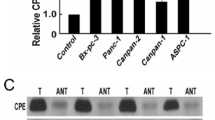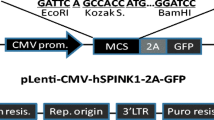Summary
CCK correlates with the generation and progression of pancreatic cancer. The research aims to construct eukaryotic expression plasmid pIRES2-EGFP/CCK (CCK pDNA) and transiently express it in COS-7 cells. Total RNA was extracted from porcine intestinal mucosa. RT-PCR was used to amplify the aimed segments CCKcDNA which was then digested with EcoR1 and BamH1 and inserted into a eukaryotic expression plasmid pIRES2-EGFP to construct CCK pDNA. The constructed plasmid was transfected into COS-7 cells by lepofectamine™2000-mediated transfer method. The expression of CCK in transfected COS-7 cells was detected 24, 48 and 72 h post-transfection with fluorescence microscopy and the expression level of CCK mRNA in transfected COS-7 cells was assayed by using RT-PCR. The results showed CCK pDNA was successfully constructed and expressed transiently in COS-7 cells. Green fluorescent protein could be detected in the COS-7 cells transfected with porcine CCK pDNA 24 h post-transfection. At 48th h post-transfection, the number of positive cells was increased significantly and much brighter green fluorescence could be detected. And 72 h post-transfection, the green fluorescence of positive cells became even stronger, while no green fluorescence was detected in the control group. The expression of CCK mRNA in the cells was detectable by using RT-PCR. In COS-7 cells transfected with CCK pDNA a high level of porcine CCK mRNA was detected while no expression of porcine CCKmRNA was found in the cells transfected with null plasmid. It was concluded CCK pDNA was expressed successfully in COS-7 cells, which lays a foundation for further research on the relationship between CCK and tumor.
Similar content being viewed by others
References
Rehfeld J F, Sun G, Christensen T et al. The predominant cholecystokinin in human plasma and intestine is cholecystokinin-33. J Clin Endocrinol Metab, 2001,86(1):251–258
Hirata M, Itoh M, Tsuchida A et al. Cholecystokinin receptor antagonist, loxiglumide, inhibits invasiveness of human pancreatic cancer cell lines. FEBS Lett, 1996,383(3):241–244
Hirata M, Tsuchida A, Iwao T et al. Cholecystokinin regulates the invasiveness of human pancreatic cancer cell lines via protein kinase C pathway. Int J Oncol, 1999,14(6):1129–1135
Aly A, Shulkes A, Baldwin G S. Gastrins, cholecystokinins and gastrointestinal cancer. Biochim Biophys Acta, 2004,1704(1):1–10
Michaud D S. Epidemiology of pancreatic cancer. Minerva Chir, 2004,59(2):99–111
Yeo C J. Pancreatic cancer: 1998 update. J Am Coll Surg, 1998,187(4):429–442
Tighe H, Corr M, Roman M et al. Gene vaccination: plasmid DNA is more than just a blueprint. Immunol Today, 1998,19(2):89–97
Bergman P J, McKnight J, Novosad A et al. Long-term survival of dogs with advanced malignant melanoma after DNA vaccination with xenogeneic human tyrosinase: a phase I trial. Clin Cancer Res, 2003,9(4):1284–1290
Weber L W, Bowne W B, Wolchok J D. Tumor immunity and autoimmunity induced by immunization with homologous DNA. J Clin Invest, 1998,102(6):1258–1264
Wei Y Q. Immunotherapy of tumors with vaccines based on xenogeneic homologous molecules. Anticancer Drugs (Chinese), 2002,13(3):229–235
Author information
Authors and Affiliations
Corresponding author
Additional information
BAI Jigang, male, born in 1976, M.D., Ph.D.
This project was supported by a grant from National Natural Sciences Foundation of China (No. 30170917).
Rights and permissions
About this article
Cite this article
Bai, J., Lü, Y. & Bai, Q. Construction of porcine CCK pDNA and its expression in COS-7 cells. J. Huazhong Univ. Sc. Technol. 27, 278–280 (2007). https://doi.org/10.1007/s11596-007-0315-7
Received:
Issue Date:
DOI: https://doi.org/10.1007/s11596-007-0315-7




